One of the most popular and acclaimed films of the last few years was The Matrix. This movie's storyline presupposes a world conquered by machines, running on artificial intelligence, which are keeping the human race in an imaginary world, using them as an energy source. With the second and third parts later reaching a huge audience, the Matrix movies portray a very advanced virtual-reality program.

The movies' hero, nicknamed Neo and played by Keanu Reeves, is a computer programmer within this system. He believes himself to be working for a large software firm and living during the last remaining years of the 20th century. But in reality, the year is 2199, and his body is being maintained in a liquid-filled capsule, in which he sees only what he is shown and can experience only what he's made to feel. He "knows" himself to be a software engineer, going to work among all the other people, while in reality, he exists in a totally different environment and a totally different century. In short, he exists in a virtual-reality environment called "the Matrix," believing that he's living an actual life.
The character called Morpheus knows the truth, that Neo lives in an imaginary world—and throughout the film, he tells Neo the reality of things. He reveals, for instance, that so far, everything Neo has seen, heard, smelled, tasted and felt had no physical reality and proves to him that all his experiences were imaginary impressions created in his brain. Later in this chapter, we'll give examples of dialogue from the movie.
 |
|---|
| The person in the picture thinks he is skiing, even there is no snow around, because he is being given the impression of skiing through artificial signals. Moreover, even though he knows he is experiencing a virtual environment he still cannot stop himelf feeling in that way. |
To put it simply, virtual reality is the projection of computer-generated three-dimensional images that appear to be real with the aid of some devices. This technology, with its diverse range of applications, is known as "virtual reality," "virtual world," or "virtual environment." Its most important feature is that by the use of some purposely constructed devices, it misleads the person experiencing it into believing the experience to be real. In recent years, the word "immersive'' has begun to be used in front of the term "virtual reality," reflecting the way that witnesses are literally immersed in the experience.
The rationale of any virtual reality system is based on our five human senses. For instance, when the user puts on a special glove, devices inside transmit signals to the fingertips. When these signals are relayed to and interpreted by the brain, the user experiences the sensation of touching a silk fabric or ornate vase, complete with all of its surface details—without any such thing actually existing in the environment.
One of virtual reality's foremost applications is in medicine. Michigan University has developed a technology that trains assistant practitioners—in particular, the personnel of emergency wards—to learn their skills in a virtual reality lab, in which environment is created by projecting the details of an operating room onto the floor, walls, and ceiling of a room. The "picture" is completed by projecting an operating table, complete with the patient to be operated on, onto the center of the room. The surgeons-to-be put on their 3-D glasses and begin their "virtual" operation. As the pictures on the next page show, anyone viewing these images cannot distinguish a real operating room from this virtual one.
 |
|---|
| Technology has revealed that we can experience very realistic perceptions without the external world: People can feel themselves in places they are not, and can feel themselves doing things while they are actually lying inert. |
In The Matrix, too, once the movie's two heroes are seated in special armchairs and get their nervous systems connected up to a computer, each one envisions himself in a totally different environment. In one scene, they are seen practicing martial arts; in another; they walk down a crowded street dressed in different clothes. When Neo expresses his disbelief that that these experiences are only computer generated, the simulations are suddenly frozen. He is forced to concede that what he thought to be real was, in fact, only an image.
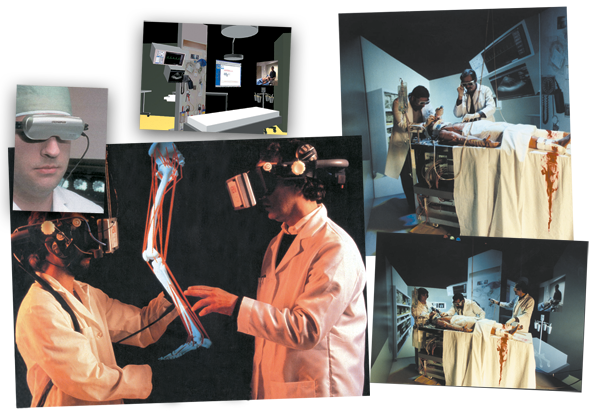 |
|---|
| Technology developed by Michigan University permits the training of doctors and particularly, emergency ward personnel in a virtual operating room. Practitioners wear 3-D glasses and operate on a virtual patient. |
Another scene finds Neo stretched out on an old chair, badly dressed in old clothes, with wires attached to his head. But when the software is loaded, he finds himself in a wholly new, simulated environment where his worn clothes are gone, his hair is longer, and he looks altogether different from his real appearance.

| Morpheus | : | It is our loading program. We can load anything from clothing to equipment, weapons, training simulations. Anything we need. |
|---|---|---|
| Neo | : | Right now, we're inside a computer program? |
| Morpheus | : | Is it really so hard to believe? Your clothes are different. The plugs in your body are gone. Your hair has changed. Your appearance is now what we call "residual self-image." It is the mental rejection of your digital self. |
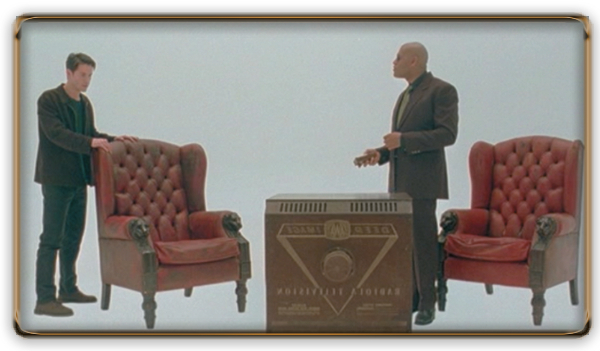
From this dialogue, it's evident that Neo is reluctant to admit that his experiences are imaginary, because they are so wholly realistic. Consequently, the following dialogue ensues between him and Morpheus, who is aware of the truth:
| Neo | : | This isn't real? (Indicating the chair) |
|---|---|---|
| Morpheus | : | What is real? How do you define "real"? If you're talking about what you can feel, what you can smell, taste and see, then "real" is simply electrical signals interpreted by your brain. |
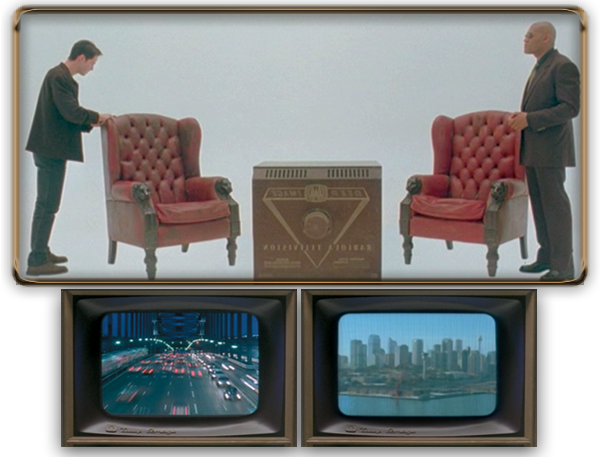
The wise Morpheus shows Neo that the world that he thought to be real is actually only a simulation. Every detail of his experiences—including cars, the noises of city traffic, the ocean, skyscrapers, people and everything else—is a computer generated impression in his mind. Notice how Morpheus' words quoted above explain scientifically how images believed to be real are formed by the brain's interpretating the electrical impulses it receives.
Below are some extracts from our previously published books on the subject:
 |
|---|
| Everything we perceive is specially recreated for us in our brains. Therefore, when we say, "We are aware of the world around us," we are talking about copied images of colors and shapes, of sounds and smells. |
• All the information we have about the world we live in is conveyed to us by our five senses. The world we know consists of what our eye sees, our hand feels, our nose smells, our tongue tastes, and our ears hear. We never think that the "external" world can be other than what our senses present to us, since we've been depending on only those senses since the day we were born. However, modern scientific research in many different fields points to a wholly different understanding, creating serious doubt about our senses and the world we perceive with them. This approach's starting point is the notion that any "external world" is a response created in our brain by electrical signals. You know that the red hue of an apple, the hardness of wood, your mother, father, your family, and everything that you own—your house, your job,—and even the lines of this book, are just electrical signals in your brain. But we can never have direct experience of their originals on the outside. (The Evolution Deceit, 7th edition, p.216)
• When we say that we "see," in fact we are perceiving the effects of impulses reaching our eyes, after they're transformed into electrical signals in our brain. That is, when we say that "we see," we are actually observing electrical signals in our mind. All the images we view in our lives are formed in our center of vision, which takes up only a few cubic centimeters of the brain's volume. Both the book you are now reading and the boundless horizon you see when you gaze out the window fit into this tiny space. (The Evolution Deceit, 7th edition, p.218)
• Everything we see, touch, hear, and perceive as matter—"the world" and "the universe"—is merely an electrical signal in the brain. No human being has ever seen true matter. (The Evolution Deceit, 7th edition, p.222)
• At this point, we encounter another surprising fact: that there are actually no colors, shapes, or voices inside our brain. All that can be detected within brains are electrical signals. This is no philosophical speculation, but simply a scientific description of the functions of our perceptions. (Matter: The Other Name for Illusion, p.18)
• The act of seeing is realized in a progressive way. Photons of light, traveling from the object, pass through the lens at the front of the eye, where they are focused and fall, reversed, on the retina. Here, the impinging light is converted into electrical signals transmitted by neurons to a tiny spot in the back part of the brain, called the center of vision. After a series of processes, this brain center perceives these signals as images. The actual act of seeing takes place in this tiny spot at the rear of the brain in pitch darkness, completely insulated from light. (The Evolution Deceit, 7th edition, pp.217-218)
 |
|---|
| No matter how realistic our perceptions, they are our minds' interpretations. Someone watching dolphins perform in the sea is, in reality, watching the vivid and colorful three-dimensional images in his brain. |
As we have seen, the subject matter of The Matrix conforms to the scientific realities published in our books. As the above quotations and dialogue from the film explain, we always deal only with the images forming in our brains. No matter how realistic our perceptions, they are our minds' interpretations. Therefore, we can never know the originals of the images we see and are part of..
We'll examine the subject in more detail with scenes from the film.
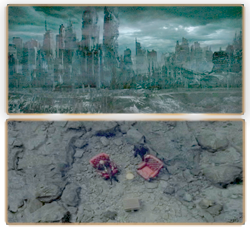 In this scene, Morpheus teaches Neo about reality by using the images on the TV screen to show him that he's living in an imaginary world he considers to be real. The modern world and all its skyscrapers, cars, and details he sees within Matrix; are all images created in his mind for him to experience. At that time, the true state of the world is altogether different: It is a destroyed, decayed planet. But until Neo was told this, he thought he was existing in the real world, without ever questioning its reality of it, having been fooled by it for all those years.
In this scene, Morpheus teaches Neo about reality by using the images on the TV screen to show him that he's living in an imaginary world he considers to be real. The modern world and all its skyscrapers, cars, and details he sees within Matrix; are all images created in his mind for him to experience. At that time, the true state of the world is altogether different: It is a destroyed, decayed planet. But until Neo was told this, he thought he was existing in the real world, without ever questioning its reality of it, having been fooled by it for all those years.
| Morpheus | : | This is the world you know. The world as it was at the end of the Twentieth Century. It exists now only as part of a neural-interactive simulation that we call Matrix. You have been living in a dream world, |
|---|---|---|
| Neo | : | ... This is world as it exists today... Welcome to the "desert of the real"... |
We can never know the originals of the material counterparts of the perceptions we experience.
We can bring this to life with the following example :
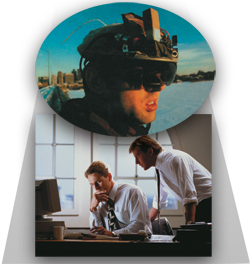
Let us first assume that our brain is removed from our bodies and artificially kept alive in a glass dome. Let us also bring in a computer capable of manufacturing all kinds of electrical signals. Then let us artificially manufacture in this computer the electrical signals for such data as the image, sound and smell belonging to a specific environment and record them. Let us connect the computer to the perception centers in your brain via cables and transmit the recorded signals to the brain. For so long as it receives these signals, the brain (or "you," in other words) will see and live the environment to which they respond.
We can send electrical signals responding to your own image from the computer to your brain. For example, when we send the brain the electrical counterparts of sensations such as sight, hearing and touch that you perceive when sitting at a table, the brain will imagine it is a businessman sitting in his office .
This imaginary world will continue for so long as the stimuli from the computer keep coming. The brain will never realize it consists solely of an image. Because all that is needed for a world to form inside the brain is for the appropriate centers in the brain to be stimulated. The stimuli may come from an artificial source, a recording device, for example, or a different source of perception. (The Evolution Deceit, 7th edition, p.225)
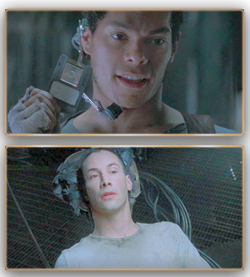 We'll never know the existence of our perceptions' material equivalents, because we live all our lives inside our brains. Present technologies like simulators are in fact important evidence that enable this to be better understood, as pointed out earlier. When Neo enters a simulated environment for training purposes, he finds it totally realistic, to the extent that he believes he's breathing that environment's air, and that his success in the fight depends on the strength of his muscles. In reality, his body is stretched out on the chair and connected to the computer.
We'll never know the existence of our perceptions' material equivalents, because we live all our lives inside our brains. Present technologies like simulators are in fact important evidence that enable this to be better understood, as pointed out earlier. When Neo enters a simulated environment for training purposes, he finds it totally realistic, to the extent that he believes he's breathing that environment's air, and that his success in the fight depends on the strength of his muscles. In reality, his body is stretched out on the chair and connected to the computer.
| Tank | : | How about some combat training? |
|---|---|---|
| Neo | : | Jujitsu? I'm going to learn jujitsu? |
| (After the downloading ends) | ||
| Neo | : | I know kung fu |
| Morpheus | : | Show me. |
| Morpheus | : | This is a sparring program, similar to the programmed reality of the Matrix. It has the same basic rules. Rules like gravity. What you must learn is that these rules are no different than the rules of a computer system. Some of them can be bent. Others can be broken. |
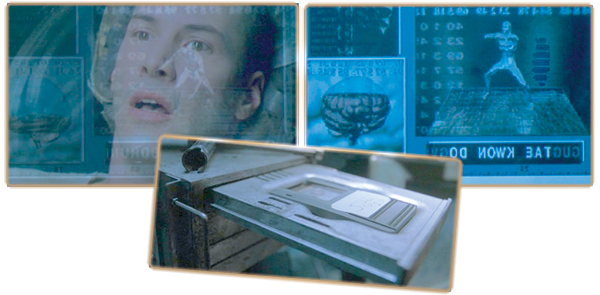
Technologies similar to those seen in the film can now give people the impression that they're existing in a completely different environment. In this case, they'll respond as if what they see, hear or do was utterly real. It's possible to project stereo images onto the floor, walls and ceiling of a room-sized cube. Entering the cube, people wearing stereo glasses can walk around and see themselves at the edge of a waterfall, on a mountain summit, in the middle of the ocean, on board a ship, or in other different environments. The headsets worn create the illusion of depth and space, and the images thus created are proportionate and life-sized. Special devices worn like gloves recreate the sensation of touch. Anyone using these devices can touch objects in the virtual environment and even move them around. These environments' sounds are also very realistic, because they can be produced from different directions and distances. Some applications can display the same virtual environment to different people around the world. With this technology, for instance, three people on three different continents can see themselves together on a speedboat or discussing issues in a meeting.

These examples show that in order to see ourselves in a certain environment, it is not essential to know what the original of the world is really like. No matter what the source of all the sensations, images, tastes and smells we perceive, it is impossible for us to identify that source. In all cases, we live in our minds and will never be able to reach the original of matter on the outside.

In one scene, Neo is introduced to the virtual world of the Matrix in a simulated environment. Everything looks perfectly realistic. Neo sees people walking down the street and waiting for the traffic lights; when the lights turn green, they cross the road. He even feels the knock to his body when someone walks into him.
| Morpheus | : | The Matrix is a system, Neo . . . But when you're inside, what do you see? Businessmen, teachers, lawyers, carpenters. The very minds of the people we are trying to save. But until we do, these people are a part of that system...You have to understand most of these people are not ready to be unplugged. And many of them are so inert, so hopelessly dependent on the system, that they will fight to protect it . . . |
|---|
At a moment when Neo is looking around, taking it all in, Morpheus says: "freeze it" and at once the image of their environment freezes as it was. The people frozen as they were, the fountain's water is frozen in time, the bird hangs in the air on the very spot. Only Neo and Morpheus continue their conversation in an otherwise frozen image. Neo is stunned but he begins to realize that everything around him is part of the imaginary world he lives in, that it has no actual reality.
| Morpheus | : | Freeze it. |
|---|---|---|
| Neo | : | This isn't the Matrix? |
| Morpheus | : | It's another training program designed to teach you one thing... |

It's impossible to prove that human life does not occur in a way similar to what we see in the film. No matter how realistic all the details of one's environment, they are experienced only in one's mind. People can never directly experience the originals of these events, places and persons outside them .. Some of our explanations on this question are given below:

• On a three-dimensional, high quality screen, an individual watches a film being projected. Since he is almost attached to this screen, he cannot succeed in detaching himself from it, so that he may grasp the situation he is in. (Eternity has Already Begun, p.101)
• …Human being watches only the world of perceptions in his brain. No one can ever come across the true original of anything. Furthermore, it's enough for everyone to perceive the copy. For example, someone who wanders around a garden with colorful flowers is not seeing the original, actual garden, but the copy of it in his brain. But this copy of the garden is so realistic that everyone receives some pleasure from it, as if the garden were real. To date, billions of people have imagined that everything they see in the garden is the original … (Matter: The Other Name for Illusion, p.50)
• At every moment, Allah creates the universe with its numberless details, perfect and without defect. Moreover, this Creation is so flawless that the billions who have lived on the Earth up until now have never understood that the universe and everything they see is an illusion, and that they have no connection with the reality of matter. (Matter: The Other Name for Illusion, p.94)
• Some people think a fast-moving bus on the highway—or an accident caused by that bus—are striking proofs of that they're dealing with the physical existence of matter, because the image they're dealing with is seen and felt as deceivingly real. For instance, the surrounding images, the perspective and depth of the highway; the perfection of their colors, shapes and shadows; the vividness of sound, smell and hardness; and the complete logic within that image can fool some people. Because of this vividness, some forget they can never experience the original of matter. Yet no matter how complete and flawless they may be, that doesn't alter the fact that they are still perceptions in the mind. (Matter : The Other Name for Illusion, p.180)
| …"Surely your Lord encompasses the people with His knowledge" (Surat al-Isra: 60) |
|---|
| |
Morpheus tries many methods to help Neo understand the reality of matter and provides much evidence in support. Previously, we saw that as part of Neo's training, the image in a copy of the Matrix was suddenly frozen, thus making it evident to Neo that everything appearing real is in fact, a virtual reality. Neo's education continues with the following conversation:
| Neo | : | What are they? |
|---|---|---|
| Morpheus | : | Sentient programs. They can move in and out of any software still hardwired to their system. That means that anyone we haven't unplugged is potentially an agent. Inside the Matrix, they are everyone and they are no one. We have survived by hiding and running from them, but they are the gatekeepers. They're guarding all the doors and holding all the keys. Sooner or later, someone is going to have to fight them. |
| Neo | : | Someone? |
| Morpheus | : | I won't lie to you, Neo. Every single man or woman who has fought an agent has died. But where they have failed, you will succeed. |
| Neo | : | Why? |
| Morpheus | : | I've seen an agent punch through a concrete wall. Men have emptied entire clips at them and hit noting but air. Yet their strength and speed are still based in a world built on rules. Because of that, they will never be as strong or as fast as you can be. |
| Neo | : | What are you telling me? That I can dodge bullets? |
| Morpheus | : | No, Neo. I'm trying to tell you that when you're ready, you won't have to. |
In this conversation, Morpheus advises Neo not to think with the laws of physics always in mind. In the Matrix system, the "agents" are security officers who can control everything by using people's virtual bodies. But because this system is only a virtual world displayed to people's minds, Neo can achieve "the impossible."
In subsequent scenes of the film, characters demonstrate supernatural powers when they have to. Although they experience them in a perfectly realistic manner, in reality these experiences are created in their brains, by the computer. Neo believes himself to be living through these nerve-racking situations, whereas in reality he remains stretched out on his chair.
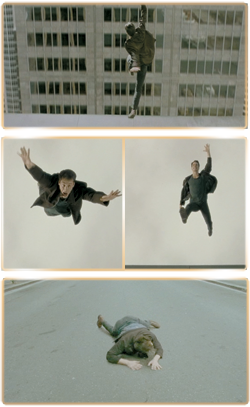
Morpheus, on the other hand—to use the expression from the film—wants to "free Neo's mind" by rescuing it from all the conditioning it's been subjected to throughout his life. To achieve this, both characters get connected to a jumping program. Morpheus leaps from skyscraper to skyscraper, bridging vast distances between them almost as if he could fly. He says that if Neo frees his mind (rids himself of prejudices), he can do the same. But even though he knows that he's inside a computer program, Neo can't manage to escape what he knows in his mind about the laws of physics. He takes his unreal environment so seriously that he's afraid of falling when he jumps.
In the following sequence, Neo is seen falling onto the concrete floor because when trying to jump from one building to another, he could not overcome his doubts and fears.
Despite the film's obvious science fiction elements, the messages it contains are truly thought-provoking. For example, anyone who realizes matter and space are imaginary, discovers another secret that other people don't know: Cause-and-effect reality does not occur because of matter's physical attributes or as a result of people's relationship with one another. Since we only have experience of perceptions of matter, the matter in our minds can't have any physical effect. Each physical cause is created separately. For instance, a thrown stone, does not break the glass. The perception of the stone being thrown, and the perception of the glass breaking, are each created separately. What makes a ship float is its buoyancy, and what keeps a bird in the air is aerodynamics, but both are created as perceptions. In reality, therefore, all such "powers" belong to Allah, Who creates them.
Neo, having learned this reality, realizes that while actually stretched out on a chair and connected to the computer, he can move outside the laws of physics upon entering the virtual world of the Matrix. As shown in the accompanying stills from the film, he finds himself ducking and moving at such incredible speed as to evade the bullets fired at him. Furthermore, everything is so realistic that when he opens his eyes on the chair, he is still in a state of great agitation. This is an important demonstration that for a person to experience a certain environment, it's not necessary for it to exist in external reality.
We have written about this subject in our books dealing with the nature of matter, explaining that the laws of physics are formed in the mind, in the following way:
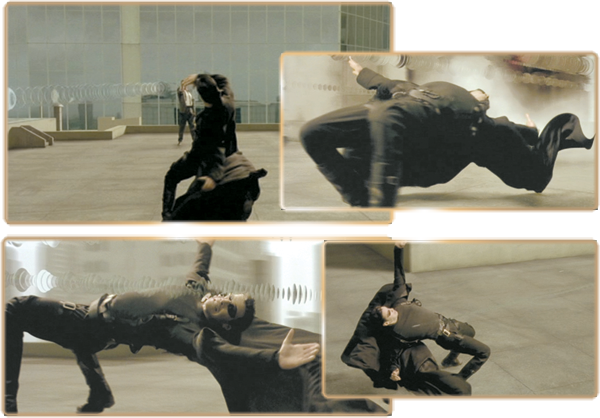
• Allah shows us the images we experience within ourselves as united by a network of cause-and-effect relationships, all linked by the laws of physics. As for the images of night and day that form in our brains, we perceive night and day as linked to the Sun and the rotation of the Earth. When, in our minds, the image of the Sun is at its height, we know that it is noon; and when it sets, we witness the fall of night. Allah created perceptions of the universe, together with a cause-and-effect relationship. We never experience daytime immediately after the Sun has gone down.(Matter: The Other Name for Illusion, p.201)
• In the illusion within our minds, whenever we drop a pen, it falls to the ground. As a result of researching the cause-and-effect relationship governing this kind of occurrences, we discover the "law of gravity." Allah presents the images He shows us in our minds as linked to particular causes and laws. One of the reasons for His creating these causes and laws is that life is created as a test.(Matter: The Other Name for Illusion, pp.201-202)
| Do you not see how your Lord Streches out shadowa? If He had wished He Could have made them stationary, Then We appoint them sun to be the Pointer to them. (Surat al-Furqan:45) |
|---|
| |
• Allah shows the images He creates as linked to particular causes and effects. When an apple drops off a tree, for instance, it always falls to earth. It never goes upwards or remains suspended in the air. The study of these effects and the laws that Allah has created form fields of study in science.(Matter: The Other Name for Illusion, p.203)
• Allah possesses the power to create effects without any causes. One proof of this is the way we can feel the heat of the Sun in a dream at night, even though the Sun is not actually shining down on us. (Matter: The Other Name for Illusion, p.204)
| Everyone on ir will pass away; but the Face of your Lord will remain, Master of Majesty and Generasity.(Surat ar-Rahman:26-27) |
|---|
| |
Since we've been using our five senses since the day we were born, we may never have thought that the "external" world could be different from what our senses show us.
Human knowledge is formed by the sensory perceptions we acquire through what we see with our eyes, what hear with our ears, and feel with our hands. In other words, each man lives in his "personal world." Thousands of times, we have met with millions of details like the stars in the firmament, the Earth we walk on, the billions who populate the world, every living creature in our environment, the furniture in our homes, house, the chair you are sitting on right now and the book you hold in our hand. But all of these are perceptions of your own personal world. No human being has ever been able to step outside the world he's experiencing. Whatever a man does, he cannot alter the fact that his entire life, even his body too, are perceptions and that he cannot deal with their originals.
The frames from the film shown opposite show Morpheus explaining to Neo what the Matrix is. During their dialogue, Morpheus compares this system to a screen that prevents Neo from seeing: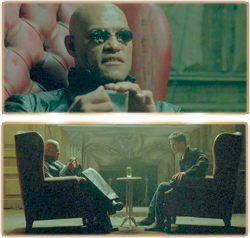
| Morpheus | : | Let me tell you why you are here. You are here because you know something. What you know you can't explain, but you feel it. You've felt it your entire life, felt that something is wrong with the world. You don't know what, but it's there. Like a splinter in your mind, driving you mad. It is this feeling that has brought you to me. Do you know what I'm talking about? |
|---|---|---|
| Neo | : | The Matrix? |
| Morpheus | : | Do you want to know what it is? The Matrix is everywhere. It's all around us. Even now, even in this very room. You can see it when you look out your window or when you turn on your television. You can feel it when you go to work ... when you pay your taxes. It is the world that has been pulled over your eyes to blind you from the truth. |
Until Neo is awakened and rescued from the capsule he was in, he remains unaware of the imaginary world that's been imposed on him. Every aspect of his life was part of this system; and feedback from all those around him suggested that this life was reality. For this reason, it takes Neo a while to become persuaded and comprehend that his life, which he thought real until then, was really a dream.
Today, the same is true for some of those who are made aware of the true nature of matter. People who believe in matter's absolute existence are positive that they are dealing with "real things" in the external world and dismiss this theory as illogical. But what has been revealed here is as certain as the laws of physics, regardless of the objections that other people may raise.
Some of our explanations are compatible with these scenes from The Matrix:
• All events and objects that we encounter in real life-buildings, people, cities, cars, places—in fact, everything we see, hold, touch, smell, taste and hear—come into existence as visions and feelings in our brains.
Conditioning means that we imagine that the world outside our brains is a fixed one and that we think we see and feel the originals of these things. In reality, however, we never see or touch real, existing materials. In other words, every material entity in our lives that we believe exists is in fact, only a vision created in our brains. (Matter: The Other Name for Illusion, p.10)
• If you think heedfully, you can sense that the intelligent being that sees, hears, touches and thinks, reading this book at this moment, is only a soul who watches the perceptions called "matter" on a screen. One who comprehends this is considered to have moved away from the domain of the material world that deceives a major part of humanity, and to have entered the domain of true existence. . . . (The Evolution Deceit, 7th edition, p.247)
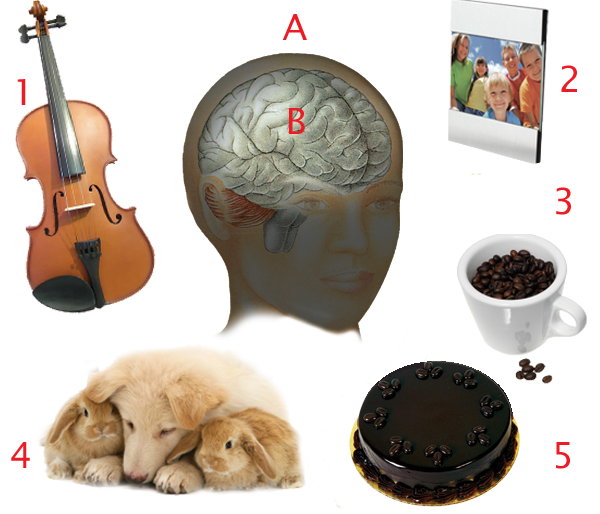
A: When nerves reaching the brain are severed, signals can no longer reach us.
B: A pitch –dark world without smells, sights, sounds, tastes, or feelingsof touch.
1: Hearing, 2: Sight, 3: Smell, 4: Touch, 5: Taste
In line with our lifelong conditioning, we believe that we regard the whole world through our eyes. We could say that our eyes are the windows that open up the world for us. But according to the scientific explanation for vision, the truth is not so! We do not see with our eyes. The millions of optic nerve cells only fulfill their role as a "cable," transmitting to our brain the signals which then become "vision."
The hero of The Matrix is misled to believe that he's living a truly vivid life, whereas he is really stretched out on a chair, his eyes closed, with wires connecting him to the machine. All the bright, colorful, vivid images he's ever seen were shown to him without the need for physical eyes. Likewise, he experiences the sensations of moving, running, and fighting without using any of his muscles. He just thinks he's doing so, while actually lying on his chair.
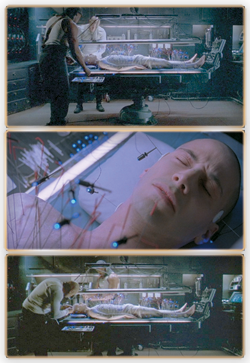 When Neo returns to real life, he is shocked to realize that until then, he's been living in a glass cylinder, albeit in an imaginary world created by electrical impulses to the brain. In that virtual world, he was a computer programmer, whereas he was actually sleeping in the room, as shown in the accompanying photographs. In other words, everything he thought to be real life was actually an illusion.
When Neo returns to real life, he is shocked to realize that until then, he's been living in a glass cylinder, albeit in an imaginary world created by electrical impulses to the brain. In that virtual world, he was a computer programmer, whereas he was actually sleeping in the room, as shown in the accompanying photographs. In other words, everything he thought to be real life was actually an illusion.
| Neo | : | What are you doing? |
|---|---|---|
| Morpheus | : | Your muscles have atrophied. We're rebuilding them. |
| Neo | : | Why do my eyes hurt? |
| Morpheus | : | You've never used them before. |
As this dialogue shows, Neo was under the impression of living a real life without his ever using his eyes or muscles, thanks to artificial signals being transmitted to his brain. In spite of never having used his vision, he experienced a truly bright and vivid and colorful world. Likewise, without ever using his muscles, he always thought himself to be on the move.
This situation is more or less the same for every human being. For instance, when you watch people shopping in a supermarket, you do not see them or the supermarket with your eyes:This sight is formed not in front of your eyes, but in the vision center at the back of your brain. Therefore, it will be possible for you to see the same sight by stimulating the relevant area of your brain with artificial impulses, with no need for using your eyes.
| Both East and West belong to Allah, so wherever you turn, the Face of Allah is there. Allah is All-Encompassing, All-Knowing (Surat al-Baqara: 115) |
|---|
| |
Some passages from our books are relevant to the frames from the film shown above:
• As we know, the electric signals coming from cells in our retinas are transformed into an image in our brains. For example, the brain interprets some electrical signals coming to the visual center in the brain as a field filled with sunflowers. In reality, it is not the eye that is "seeing."
Therefore, if we are not seeing with our eyes, what is it that does see the electrical signals as a sunflower field, at the back of our brain, in a pitch dark place, without any need for any eyes, retina, lens, visual nerves or pupil—and still enjoys the view?
... Who is it, then, that perceives the sights in a brain as if watching television, and becomes excited, happy, sad, nervous, or feels pleasure, anxiety or curiosity while watching them? Who is responsible for the consciousness that can interpret everything seen and everything felt?
... What is the entity in the brain that has consciousness and, throughout life, can see all the sights before him in a dark, quiet head; that can think, reach conclusions, and make final decisions?
It is obvious that the brain, made up of unconscious water, lipids, proteins and atoms, does not perceive all this and is responsible for consciousness. There must be a being beyond the brain.
... That entity inside the brain that says, "I am seeing" sights inside the brain, and "I am hearing" sounds inside the brain and aware of its own existence; and which says, "I am me," is the soul Allah has given to human beings. (Matter: The Other Name for Illusion: 81-82)
Adnan Oktar: For one thing, in order to conduct a scientific study a person would have to step outside his brain, in order to see the original of everything. The original of matter on the outside is very different. For example, there is no sunlight. Scientists themselves say that. In addition, matter is invisible on the outside. It is invisible because of the spaces between its parts. But the eye sees it in visible form. For instance, there is no color outside. We see 7 colors and their various hues. There is no color on the outside. There are wavelengths. That is why when a scientist says he has conducted a study in the laboratory he is doing the research in the laboratory shown him by Allah. He can never establish direct contact with the outside. Allah also creates the outside. That is another issue. But nobody is in direct contact with the outside world. Neither can they hear the originals of sounds. There is in any case no sound on the outside, just waves. All ears are deaf. The ear is just a tool that turns sound waves into electricity. All ears are deaf. They forward electric current to the brain. The ear in the brain does the listening. All eyes are blind. People say that their eyes see. Not at all. Everyone's eyes are blind. The eye just works like a camera, the eye sees to the same extent that a camera or video recorder sees. The same goes for the one as for the other. Eyes are blind. The eye simply takes electricity, the image, and forwards it to the brain. The brain in the eye does the seeing. There is an eye that people cannot see. And an ear they cannot see. That does the hearing. And it is the soul. People are unaware of this. The whole is completely metaphysical. And it has an extraordinary structure. (From Mr. Adnan Oktar's Kral Karadeniz TV interview, 23 March 2009)
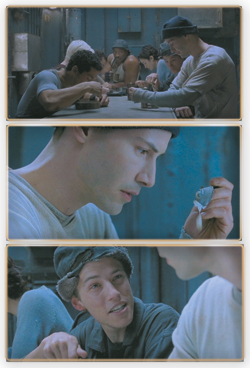 As with all the other senses, taste can be explained in a similar way. In the small bumps of the tongue are the taste receptors, which respond to the flavors of salty, sweet, sour and bitter. Following various processes, these stimuli are converted into electrical signals and transmitted to the brain, where they are perceived as tastes. The taste of cheese, an orange, or a cake you like to eat is in reality the brain's interpretation of electrical signals.
As with all the other senses, taste can be explained in a similar way. In the small bumps of the tongue are the taste receptors, which respond to the flavors of salty, sweet, sour and bitter. Following various processes, these stimuli are converted into electrical signals and transmitted to the brain, where they are perceived as tastes. The taste of cheese, an orange, or a cake you like to eat is in reality the brain's interpretation of electrical signals.
In The Matrix, this point is dramatized in a conversation taking place at the table:
| Apoc | : | Breakfast of champions, Neo. (Neo is served a wheat-like food) |
|---|---|---|
| Mouse | : | Close your eyes, it feels like you're eating runny eggs. You know what it reminds me of? Tastee Wheat. Did you ever eat Tastee Wheat? |
| Switch | : | No, but technically neither did you. |
| Mouse | : | That's exactly my point. Exactly. Because you have to wonder how do the machines really know what Tastee Wheat tasted like? Maybe they got it wrong. Maybe what I think Tastee Wheat tasted like actually tasted like oatmeal or tuna fish. That makes you wonder. Take chicken, for example. Maybe they didn't know what to make it taste like which is why it tastes like everything. |
| Dozer | : | It's a single-celled protein combined with synthetic aminos, vitamins and minerals. Everything the body needs. |
In another scene, one character who knows the reality—that the Matrix system keeps them in an artificially created World - describes the food he's eating:
| Mr. Reagan | : | You know, I know this steak doesn't exist. I know that when I put it in my mouth, the Matrix is telling my brain that it is juicy and delicious. |
|---|---|---|
 |
|---|
| If nerves connecting the taste buds to the brain were severed, someone drinking strawberry juice would not taste anything at all.. |
He knows that a computer program makes his whole life appear to him as if it was real. Therefore, he says that the taste of the beefsteak he's eating doesn't exist in reality, that his brain only perceives this is so. But he also says that he enjoys it, just as if it was real. Some of the similar passages in our books are as follows:
• An image of a cake will be linked with the taste of the sugar, all of which occurs in the brain. Everything sensed is related to the cake you like so much. The taste you are conscious of after eating your cake, with a full appetite, is nothing more than an effect generated in your brain caused by electrical signals. You are aware of only what your brain interprets from the external stimuli, and can never reach the original object. For example you cannot see, smell, or taste the actual chocolate itself. If the nerves from your tongue to your brain were severed, it would be impossible for the taste of foods to reach your brain, and you would lose your sense of taste entirely. Certainly the tastes you are aware of seem extraordinarily real, but that should not deceive you. This is the scientific explanation of the matter.(Matter: The Other Name for Illusion, pp.40-41)
• In the same way, nobody has been able to taste original mint. The taste someone would sense as mint is only a perception which occurs in the brain. This is because the person cannot touch the original of the mint, see the original of the mint or smell or taste the actual mint. In conclusion, throughout our lives, we live with copy-perceptions that are shown to us. However, these copies are so realistic that we never realize that they are copies.(Matter: The Other Name for Illusion, p.48)
• The taste you get when you eat fruit or a chocolate is the brain's interpretation of electrical signals. You can never reach the object outside; you can never see, smell or taste the chocolate itself. For instance, if nerves from your tongue that travel to your brain are cut, no flavors you eat will reach your brain; you will completely lose your sense of taste. At this point, we come across another point: We can never be sure that a food tastes the same to us as it does to another person, or that a voice we hear sounds the same as when another person hears it.(The Evolution Deceit, 7th edition, pp.220-221)
| Any blessing you have is from Allah... |
|---|
| |
| Smells from the external world, which we've known since birth, are simply electrical signals received through our nostrils. |
The smells you perceive do not reach you from any distance. You mistake the effects taking place in your olfactory center are the smells of some external matter. Just as the sight of a rose occurs inside your vision center, likewise the rose's smell "happens" in the brain's center for smell. You cannot know the outside existence of a rose or its scent: The external world that our senses present to us is really nothing more than the totality of electrical signals reaching our brains. The brain interprets these signals throughout our lives, and so throughout our lives, we never realize that we're wrong to believe that we're interacting with actual matter "out there."

One scene of The Matrix questions the reality of smell, but on the other hand, notes its overpowering presence:
| Agent | : | : I hate this place, this zoo, this prison—this reality, whatever you want to call it. I can't stand it any longer. It's the smell. If there is such a thing, I feel saturated by it. |
|---|
From this statement from the Matrix system's agent, we can deduce that it's impossible to determine what the original of the smell is, just like all our other senses,. Our books also explore this subject:
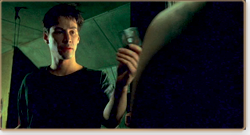 • Volatile molecules emitted by vanilla or roses reach the receptors in the epithelium of the nose and become involved in an interaction that is transmitted as electrical signals to the brain and perceived as smell. Everything we smell, be it nice or noxious, is nothing but the brain's perception of volatile molecules' interactions, transformed into electrical signals. You perceive the scent of perfume, a flower, a food that you like, the sea, as well as other odors you like or dislike in your brain. The molecules themselves never reach the brain. Just as with sound and vision, what reaches your brain is simply electrical signals. In other words, all the odors that you have assumed, since you were born, to belong to external objects are simply electrical signals that you feel through your sense organs. (The Evolution Deceit, 7th edition, p.220)
• Volatile molecules emitted by vanilla or roses reach the receptors in the epithelium of the nose and become involved in an interaction that is transmitted as electrical signals to the brain and perceived as smell. Everything we smell, be it nice or noxious, is nothing but the brain's perception of volatile molecules' interactions, transformed into electrical signals. You perceive the scent of perfume, a flower, a food that you like, the sea, as well as other odors you like or dislike in your brain. The molecules themselves never reach the brain. Just as with sound and vision, what reaches your brain is simply electrical signals. In other words, all the odors that you have assumed, since you were born, to belong to external objects are simply electrical signals that you feel through your sense organs. (The Evolution Deceit, 7th edition, p.220)
• There is no need to know what the original on the outside is like to form an image in your mind. This same situation holds true for the sense of smell. Just as in your dreams or imagination, you can become aware of a smell that doesn't really exist, you can't be sure whether the objects you smell in real life are like on the outside. You can never have direct experience of the originals of these objects on the outside. (Matter: The Other Name for Illusion, p.40)
When people awaken from a dream, straightaway they realize what they experienced was a dream, but never question what they call "real life," beginning with the "waking scene." They never consider that for some reason, it might possibly be a dream itself. We perceive what we call "real life" identically as we do our dreams: Both are visions of the mind. As long as we are not awakened from a dream, we're not aware that it is one. Only on awakening can we say, "Ah, it was only a dream."
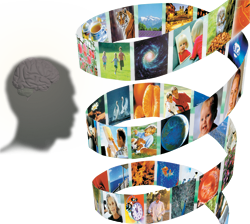
How can you ascertain that what you're seeing now is not a dream? Couldn't you be considering this moment as real simply because you haven't yet woken up? It's very possible that one day, we'll waken up following a longer dream than usual and have to face up to this reality. We have no evidence to the contrary!
In your dreams, you hold objects in your hands and see with your eyes, but there are really no hands or eyes, nor anything to behold or hold. There is no material basis for all this outside the brain; clearly you are being fooled. But what separates real life and the dream world? Is real life continuous, and dreams seen only in intervals? Or in the dream world, do perhaps a different set of cause-effect rules operate? Fundamentally, these differences are not significant, because in the end, both lives are lived in the brain. If we can perfectly live an unreal life in our dreams, couldn't the same be true for the so-called "real" world we live in? When we wake up from one dream, we can't be certain that another new, longer-lasting one called real life doesn't begin. Our only basis for concluding that dreams are imaginary and the world is real are habit and conditioning. One day, we might get woken from the life we think we're living in this world, just as when we're woken from a dream.
This important subject is explored in The Matrix, where Neo finds himself in an ongoing confusion between real life and a dream world. In one scene, he sees his face split three ways in a cracked mirror. But then the cracks in the mirror disappear, and he sees himself reflected whole, as he would expect. Still stunned from this experience, he turns and asks the others whether they also saw this transformation. To check the reality of his experience, he touches the mirror—which immediately turns into a sticky substance that starts to cover his body in a metallic coating. He even feels the coolness of this substance on his body. But even though he doesn't consider this to be possible, it's realistic enough for him to lose his equilibrium. The wise Morpheus asks him what the difference is between the real and the dream world, with the intention of helping Neo not be fooled by what he sees and experiences.
| Morpheus | : | Have you ever had a dream, Neo, that you were so sure was real? What if you were unable to wake from that dream, Neo? How would you know the difference between the dream world and the real world? |
|---|---|---|
| Neo | : | This can't be ... |
| Morpheus | : | Be what? Be real? |
Below are some extracts from our previous books on this subject:
• A person falling in a dream feels it with all his body, even though he is lying immobile in bed. Even sleeping in a very hot room, one might dream of slipping in a puddle, getting soaked and feeling chilled by a cold wind. But in such a case, there is neither puddle nor wind: One experiences the wetness and cold as if one were awake. (Matter: The Other Name for Illusion, p.62)
• A person sleeping in his house can see himself on a rapidly turning wagon in a fair ground while dreaming. He can realistically sense the wind that he would experience on a fast-moving wagon in the real world. (Matter: The Other Name for Illusion, p.63)
Another Matrix scene draws attention to the similarity between dreams and the real life, in which Neo addresses customers coming to his front door to buy computer chips. In the adjoining stills, Neo just can't tell whether or not he has woken up. When he does wake up, he hears the alarm clock ringing. He is in his room and he sees his desk and his computer. But what he experienced in his dream was so realistic that he can't be sure it was only a dream. Customers coming to his door tell him that he doesn't look too good, because of Neo's confusion over his contradictory experiences. He tries to share this duality he witnessed by asking them, "Ever have that feeling where you're not sure if you're awake or dreaming?"
Actually, the duality Neo experiences is quite natural; every thinking person can become aware of it. Many parts of our books deal with this issue, of which the following are only a few:
What would happen if we didn't wake up and kept on dreaming? Would we be able to realize that we weren't actually dealing with the originals of anything we lived and saw in our dream?
Morpheus, who is aware of the reality, repeatedly advises Neo not to believe everything he sees, because one must investigate reality in order to understand it. In the following dialogue from the film, Morpheus points out that Neo must question everything he perceives before believing in it:
| Morpheus | : | I can see it in your eyes. You have the look of a man who accepts what he sees because he is expecting to wake up. Ironically, this is not far from the truth. |
|---|
We too must question the reality of the world we live in. We must come to realize that we'll never be able reach the actual world that exists outside ourselves and from "inside" here, we must find our true purpose in this world.
The reality—that we are not interacting with matter itself—is frequently brought to our attention in the film; below are some excerpts from our books on the subject:
 • People usually do not include or rather, do not want to include everything in the concept of the "external world." . . . If you think sincerely and boldly on this issue, you'll come to realize that in fact, your house and furniture in it, your car—perhaps recently bought, your office, your jewels, bank account, wardrobe, your spouse and children, your colleagues and all else that you possess are included in this imaginary external world projected to you. Everything around you that you perceive with your five senses is part of this "imaginary world"—the voice of your favorite singer, the hard chair you sit on, a perfume whose smell you like, the Sun that keeps you warm, a flower of beautiful colors, a bird flying past your window, a speedboat moving swiftly on the water, your fertile garden, the computer at your job, or your hi-fi with the world's most advanced technology. . . This is the reality. The world is only a collection of images created to test man. All through their limited lives, people are tested with perceptions, the originals of which they can never experience. (The Evolution Deceit, 7th edition, p.232)
• People usually do not include or rather, do not want to include everything in the concept of the "external world." . . . If you think sincerely and boldly on this issue, you'll come to realize that in fact, your house and furniture in it, your car—perhaps recently bought, your office, your jewels, bank account, wardrobe, your spouse and children, your colleagues and all else that you possess are included in this imaginary external world projected to you. Everything around you that you perceive with your five senses is part of this "imaginary world"—the voice of your favorite singer, the hard chair you sit on, a perfume whose smell you like, the Sun that keeps you warm, a flower of beautiful colors, a bird flying past your window, a speedboat moving swiftly on the water, your fertile garden, the computer at your job, or your hi-fi with the world's most advanced technology. . . This is the reality. The world is only a collection of images created to test man. All through their limited lives, people are tested with perceptions, the originals of which they can never experience. (The Evolution Deceit, 7th edition, p.232)
• Think for a moment about those who are swept away by material greed: What do they value most? A fine house, luxurious things, ostentatious jewelry, the latest model car, big bank accounts, a yacht . . . These people are afraid that they might be observing on a screen in their brains all the things they possess, and that they will never actually possess these things. Like it or not, they are living in a world of facsimiles composed in their brains and cannot possibly have any relationship with the external world. Sounds, light and smells cannot enter the skull; but only electrical impulses coming from the sense organs.(Matter: The Other Name for Illusion, p.106)
• Everything a person thinks he possesses—house, car, family, job and friends —all are composed of images and sensations that occur in the brain. Anyone who understands this will also understand that the One Who has created these images in his brain is Allah, to Whom all things belong. For that reason, those who are emotionally attached to the life of this world greatly fear this reality.(Matter: The Other Name for Illusion, p.105)
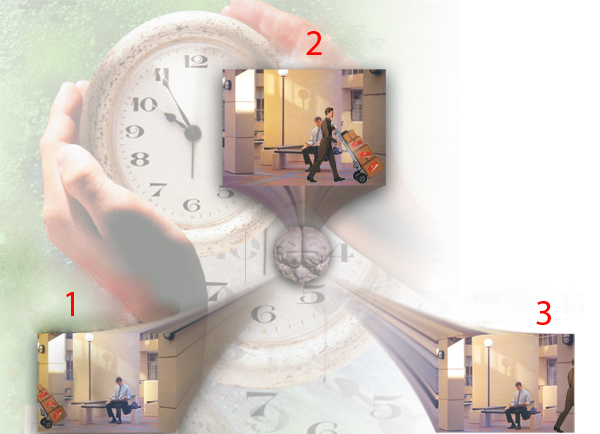
1. Past, 2. Present, 3. Future
Time is a relative concept, based on comparisons we make between the events we experience. For example, someone gets in a car, turns on the ignition and puts his foot on the gas pedal. After driving a certain distance, he parks at the curb. Making comparisons between these actions, he thinks that a certain amount of time has passed between them, and thus he obtains a sense of duration.
Because we perceive everything sequentially, in a certain order, we come to believe that time flows forward. For instance, a leaf always falls down, not up. And raindrops fall from the sky; we never see them moving upwards, drop by drop. In this scenario, a leaf still on the tree is the present. Its falling to the ground is the future.
But if the data in our memories were to be rewound like a film on tape, the future—in other words, the leaf on the ground—would be past, and its being still on the tree would lie in the future. As we can see from this example, time is relative, dependent on the viewer's perception. A great span of thousands of years in our view, can be less than an instant in another dimension.
| He will say, "How many years did you tarry on the earth?" |
|---|
| |
The Matrix points out that alongside all other perceptions, time is relative too. Neo comes to realize that he was wrong about time. In the frames shown below, Neo finds himself inside an American-ship built in 2060 designed for land and air transport. The fashionable garb he wore in the Matrix is replaced with worn clothing, and the 20th-century world he lived in has made way for a derelict environment.
| Neo | : | Morpheus, what's happened to me? What is this place? |
|---|---|---|
| Morpheus | : | More important than "what" is "when." |
| Neo | : | When? |
| Morpheus | : | You believe it's year 1999 when in fact, it's closer to 2199. I can't tell you exactly what year it is, because we honestly don't know. There's nothing I can say that will explain it for you. |
As with everything else experienced with artificial stimuli, it is possible to alter someone's perception of time. From our books, here are some passages on the subject of timelessness:
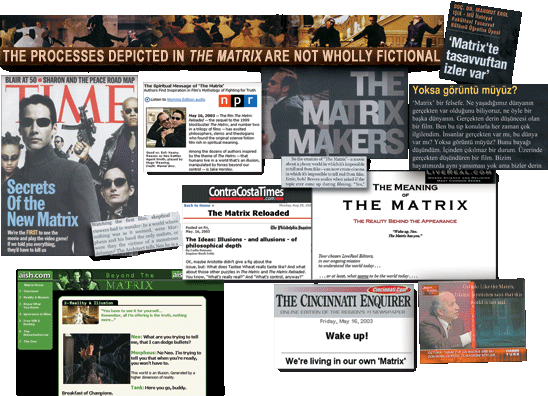 |
|---|
| The Matrix and Matrix Reloaded created great controversy. Many TV channels, magazines, and newspapers discussed the scientific facts of matter in relation to these films' subject. One of the foremost reasons why the film attracted the interest of millions, is their awareness of—and pondering on—this subject's importance. |
• ... that time is a relative notion; that it is not static and unchanging as materialists long believed; and that it is a changing form of perception were also discovered in this century. The relativity of time and space has been proven by Einstein's Theory of Relativity, which laid the basis of today's modern physics. To sum up, time and space are not absolute concepts. They have a beginning, and Allah created them from nothing. Allah, Who has created time and space, is certainly unfettered by these. Allah has defined, determined and created every moment of time in timelessness ... (Timelessness and the Reality of Fate, p.10)
• ... Being bound by time, such an incident seems impossible for man. Yet in the Sight of Allah, time does not exist. As stressed earlier, past and present are all one single moment; just as a videotape cassette includes all the action, moment by moment, in a film. After watching a film, it is possible to rewind and re-watch it. The same is likewise true for daily events; by the will of Allah, it is possible to see past events again. We only need Allah's making us experience once more the same perceptions belonging to these events. (Eternity Has Already Begun, 95)
Fifteen billion years ago, scientists say, "there was no time or space." But they describe the first matter as follows; zero volume. Non-existent, in other words. They say there was something of infinite density. They say the universe came into being when that exploded. So they agree with the account in the Qur'an. Almighty Allah says the universe was created from nothing in the Qur'an. They have finally arrived at what the Qur'an says. And it came about in a moment. Time and space also formed with that explosion. In other words, the universe took shape in seconds, or less, in micro-seconds. Time began after that. There was no time or space before. (From Mr. Adnan Oktar's Kanal 35 interview, 25 January, 2009)

Upon Neo's return to the virtual environment of the Matrix, after discovering that what he thought to be his life was only imagined, he is simply amazed by this environment. Throughout the car journey, Neo remembers events of his past, but is perplexed to consider that none of it was real. Everything he thought was a memory of his past, had been planted in his memory artificially.
| Morpheus | : | Unbelievable, isn't it? |
|---|---|---|
| Neo | : | God ... |
| Trinity | : | What? |
| Neo | : | Used to eat there ... Really good noodles. I have these memories, from my life. None of them happened. |
Our books offer some explanations on this subject:
• Similarly, the sweet taste you discovered in chocolate when you were only five years old, the anxiety you felt on the first day of the primary school, the boredom you felt in one of your high school classes, the difficult equations your physics teacher wrote on the blackboard, the grief you felt on losing a close friend in a traffic accident, the pride you took in your academic accomplishments, the glow of happiness you felt when you succeeded at something you had strived for—in brief, all your experiences and feelings remain just as they were; not simply kept in your memory. You perceive your memory as simply the past. Though these scenes exist right now, the brain does not perceive them… Believing them bound by a steady, unvarying time flow from the past to the future, people assume their lives are divided into distinct sections of past, present and future…However, knowing that every living thing, every event and object is created eternally, frame by frame—just like the frames making up a roll of film—and brought into being simultaneously, will make this easier to comprehend.(Eternity Has Already Begun, pp.79-80)
| ...We have stripped you of your covering and today your sight is sharp Return to your Lord, well-pleasing and well-pleased! |
|---|
| |
Outside the brain exists a world we call matter, evoking sensations of solidity and visibility. But you can never reach this world with your senses. Every human being watches a world that takes shape in his brain, touches this world in his brain and listens to its sounds in his brain.
Allah lets every human being watch this material world as a vision in his brain adding to it solidity and hardness, to the point that this vision is perceived as real. Imam Rabbani explained this reality, proven in the twentieth century by scientific evidence, in great detail. In one of his letters, he wrote:
Allah lets every human being watch this material world as a vision in his brain adding to it solidity and hardness, to the point that this vision is perceived as real. Imam Rabbani explained this reality, proven in the twentieth century by scientific evidence, in great detail. In one of his letters, he wrote:
Every human being must reflect most seriously upon the reality revealed here, because everyone who ignores it, is fooled for the duration of his life by a perception appearing on one small area of the brain, which he believes to be real. For example, a man becomes vain and arrogant to think that he owns the buildings appearing on one portion of his brain, forgetting that one day, he too will die. In the brain of someone else, the perception of being destitute leaves him hopeless and depressed. One who loses the visualization of money in his brain becomes instantly devastated. Someone else who sees—in his brain—his car's paintwork scratched becomes angry, and his love of property drives him frantic.
In reality, none of these people is any different, one from the other. Seeing one's self poor or rich, or seeing one's car being scratched, is an image forming in the brain. No one ever can see or know what lies outside his brain. Only Allah, Who creates the world inside—and also outside—our brains, knows this.
People who are ignorant or unaware of this reality or those do not want to acknowledge the very clear truth, will always live in error. They are comparable to someone watching a play or movie in the belief that it's real and therefore, wants to be part of it. No matter how much the audience around him try to persuade him or show him the truth, he will always pretend not to understand.
Without exception, every human being will understand this truth, comprehend, and acknowledge it one day. This moment will come to everyone upon his death, when his brain's perception of life in this world will give way to the perception of death, judgment day, and the Hereafter. As Allah revealed in the Qur'an, death will be like awaking from sleep, like proceeding from a dream to reality. One will move on to the true, endless life; and the perception of this life will become much clearer too. Allah, the Lord of all the worlds, reveals this reality in the verses:
They will say, "Alas for us! Who has raised us from our resting-place? This is what the All-Merciful promised us. The Messengers were telling the truth." (Surah Yasin: 52)
"You were heedless of this, so We have stripped you of your covering, and today your sight is sharp." (Surah Qaf: 22)
Reality is the life after death. Earth is an imaginary world shown to us on a little area of our brains, just like a dream. It is an enormous and heedless error to be misled by this imaginary world, forgetting to ponder the real, infinite life to come. Those who refuse to recognize this fact during this life will suffer great remorse in the Hereafter. When they realize that the people, properties, ranks and offices—to which they were devotedly attached throughout their lives; which they blindly pursued by believing that they were real; which they associated with Allah by forgetting Him and the Hereafter—are actually only imaginary and people who realize that throughout their lives they only ever had direct experience of copies in their brains will express their remorse. They will be devastated to see all the things they thought would exist forever falling, one by one, by the wayside. In the Qur'an, Allah reveals their confessions in the Hereafter:
Then they will be asked, "Where are those besides Allah you associated with Him?" And they will reply, "They have forsaken us. Or rather, we were not calling to anything at all before." That is how Allah misguides the disbelievers. (Surah Ghafir: 73-74)
... Such people's portion of the Book will catch up with them, so that when Our messengers come to them to take them in death, saying, "Where are those you called upon besides Allah?" they will say, "They have left us in the lurch," testifying against themselves that they were disbelieving people. (Surat al-A'raf: 37)
Every single person who refuses to acknowledge and ponder this reality in this life can well be saying these same things, experiencing this same irreversible regret in the Hereafter. Those who lose themselves in this worldly life, which Allah shows us just like a dream; who think that this life is the only real one and that death is its end, will wake from their sleep of ignorance, leave their dreams behind with their death, and see the real truth. On the other hand, every sincere, carefully thinking person will realize the reality while still on Earth and make a genuine effort to win his life to come in the Hereafter.
| Truly it is to you Lod that you willreturn. |
|---|
| |